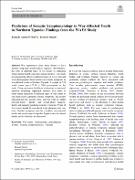| dc.contributor.author | Amone-P’Olak, Kennedy | |
| dc.contributor.author | Omech, Bernard | |
| dc.date.accessioned | 2021-11-23T06:32:37Z | |
| dc.date.available | 2021-11-23T06:32:37Z | |
| dc.date.issued | 2020 | |
| dc.identifier.citation | Amone-P’Olak, K., & Omech, B. (2020). Predictors of Somatic Symptomatology in War-Affected Youth in Northern Uganda: Findings from the WAYS Study. Psychological Studies, 1-9. | en_US |
| dc.identifier.uri | https://doi.org/10.1007/s12646-020-00551-1 | |
| dc.identifier.uri | https://hdl.handle.net/123456789/355 | |
| dc.description.abstract | War experiences have been shown to have
adverse long-term psychological sequelae. Nevertheless,
the roles of different types of war events in predicting
which mental health outcomes remain unclear. This study
investigated the effects of different types of war events and
socio-demographic characteristics on somatic symptoms in
war-affected youth in Northern Uganda. A sample of 539
youth (mean age = 22.39; ± 2.03) participated in the
study. Using maximum likelihood estimation in structural
equation modelling, regression analyses were fitted to
relate binary indicators of different types of war events to
one latent factor capturing somatic symptoms. The results
indicated that sex, marital status, and war types of ‘‘direct
personal harm’’, ‘‘deaths’’, and ‘‘sexual abuse’’ independently
and uniquely predicted somatic symptoms. Types of
war events should be considered when planning interventions.
Somatic symptoms may be a window into physical
health and psychological sequelae. Implications for mental
health service delivery are discussed. | en_US |
| dc.language.iso | en | en_US |
| dc.publisher | Psychological Studies | en_US |
| dc.subject | War events | en_US |
| dc.subject | Demographic characteristics | en_US |
| dc.subject | Somatic symptomatology | en_US |
| dc.subject | Youths | en_US |
| dc.subject | Uganda | en_US |
| dc.title | Predictors of Somatic Symptomatology in War-Affected Youth in Northern Uganda: Findings from the WAYS Study | en_US |
| dc.type | Article | en_US |

